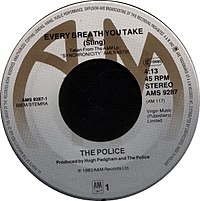Every Breath You Take
| Every Breath You Take | |
|---|---|
| The Police | |
| publication | May 20, 1983 |
| length | 4:13 (album version) 3:56 (single version) |
| Genre (s) | New wave , pop |
| Author (s) | Sting |
| Producer (s) | The Police, Hugh Padgham |
| Label | A&M Records |
| album | Synchronicity |
|
Chart positions Explanation of the data |
||||||||||||||||||||||||||||||||||||||||||||||||||||||||||||||||||||||||||||||||||||||||||||||||||||||
| Singles | ||||||||||||||||||||||||||||||||||||||||||||||||||||||||||||||||||||||||||||||||||||||||||||||||||||||
|
||||||||||||||||||||||||||||||||||||||||||||||||||||||||||||||||||||||||||||||||||||||||||||||||||||||
Every Breath You Take is a 1983 song by The Police , written by Sting . It appeared on Synchronicity , The Police's final studio album.
History of origin
The song was written in the final stages of Sting's marriage to Frances Tomelty. The lyrics tell of a person who is always in control of his partner: "Every breath, every movement, every broken promise, every step of the way - I'm watching you!"
Sting on Every Breath You Take :
“ I woke up in the middle of the night with that chorus in my head, sat at the piano and had written the song in half an hour. The melody itself is ordinary, a bunch of hundreds of others, but the words are interesting. It sounds like a comforting love song. I didn't realize at that moment how scary the song is. I think I was thinking of Big Brother , surveillance and control. "
According accompanying book box sets Back to Mono from Phil Spector to Every Breath You Take by the song Every Breath I Take the Gene Pitney has recorded 1961 be affected. The lyrics have similarities, with the opening lines telling a short story about science fiction writer Judith Merril called Whoever You Are . The chorus was inspired by the Leo Sayer song More Than I Can Say .
In 2019, British Music Inc. determined that the song was the most played song on the radio, with over 15 million plays at the time. It replaced the song You've Lost That Lovin 'Feelin' by the Righteous Brothers , which had held the record since 1996.
Recording and publication
The song was a track on the Police LP Synchronicity , which was recorded between December 1982 and February 1983 in the AIR studios on the Caribbean island of Montserrat . Hugh Padgham was the producer . Every Breath You Take is the first track on page 2 of the LP, with Sting's vocals over a steady rhythm with a distinct bass and controlled drums. The guitarist presents a guitar riff that characterizes this piece . The original demo version was played with a Hammond organ . Andy Summers recorded his Béla Bartók- inspired guitar part in a single recording.
Especially with Every Breath You Take , the disputes between Sting and drummer Stewart Copeland escalated, so that the producer Padgham had to intervene. While the other album titles each took about a day to record, the simplicity of Every Breath You Take required an entire week. The overdubbing and the final mix took place in Studio Morin Heights , Quebec.
The song was one of four tracks that were released as a single from the LP. Every Breath You Take was released on May 20, 1983, shortly before LP (June 1, 1983) and topped both the UK and US charts. It was the band's only million seller .
The music video for the song was shot in black and white , directed by Godley & Creme .
Cover versions
- 1984: Sir Douglas Quintet
- 1984: Weird Al Yankovic (Polka Your Eyes Out (Polkas On 45))
- 1985: Sacha Distel
- 1986: The Shadows
- 1992: Sting
- 1994: Tammy Wynette feat. Sting
- 1994: London Symphony Orchestra
- 1996: Shirley Bassey
- 1997: Puff Daddy & Faith Evans feat. 112 ( I'll Be Missing You )
- 1997: Gloria Gaynor
- 1997: Jack Jones
- 1997: Eläkeläiset (Humppaleski 45)
- 1998: Chris Minh Doky
- 1999: Melanie Safka
- 2000: Royal Philharmonic Orchestra
- 2000: Juliana Hatfield
- 2001: Bart Kaëll feat. Vanessa Chinitor
- 2001: Vonda Shepard feat. Robert Downey Jr. & Sting
- 2002: Otto Waalkes (you annoy me so much)
- 2002: Scala & Kolacny Brothers
- 2003: Fame Academy feat. Christopher Come on
- 2004: UB40
- 2005: Karmah (Just Be Good to Me)
- 2005: Karen Souza
- 2006: Mark 'Oh (Let It Out (Shout Shout Shout))
- 2009: DJ Antoine (Every Breath)
- 2012: Singer Pur
- 2012: Thelma Aoyama feat. Brian McKnight
- 2014: Denmark + Winter
See also
Web links
- Lukas Karsten: Every Breath You Take . In: Songlexikon , accessed on November 3, 2014
Individual evidence
- ↑ Chart sources: DE AT CH UK US1 US2
- ^ Sting website
- ↑ Sting's “Every Breath You Take” Is the Most Played Song on Radio , guardianlv.com, May 15, 2019
- ^ Summers, Andy (2006). One Train Later: A Memoir , Thomas Dunne Books, pp. 323-324.
- ↑ Sound on Sound from March 2004 on Every Breath You Take
